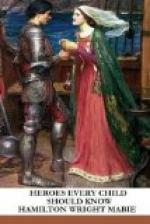So the envoys departed, and came again in the time appointed, and they brought with them the shirt of the Old Man and his ring, which was of the finest gold, and with these things this message: “As man wears no garment that is nearer to him than his shirt, so the Old Man would have the King nearer to him than any other King upon earth; and as a ring is the sign of marriage by which two are made one, so the Old Man would have himself and the King to be one.” Other gifts there were, an elephant of crystal, very cunningly wrought, and a monster which they call a giraffe, also of crystal, and draughts and chessmen, all finely made. The King, on his part, sent to the Old Man a great store of newels, and scarlet cloth, and dishes of gold and bridles of silver.
While the King was at Jaffa it was told him that if he desired to make a pilgrimage to Jerusalem the Sultan of Damascus would give him a safe-conduct. The King consulted his nobles on the matter, and both he and they were of one mind in the matter, to wit, that he should not go. “For,” said they, “if the King should go as a pilgrim, when he has not been able to take the Holy City itself out of the hands of the infidel, then will other Kings in time to come do the same. They will be content to go as pilgrims, but will take no thought as to the city, whether it be held by Christian or infidel.”
After these things the King went to the city of Sidon and fortified it with strong walls, for he was greatly unwilling to give up his hope of winning the whole land out of the hands of the infidel. But when he had brought this work to an end, there came news to him from his own country that the Queen his mother, who was charged with the government thereof, was dead. Then he took counsel with his nobles what he should do, and it seemed to them that he must of necessity return to France. One among them put the case before the King as follows:




